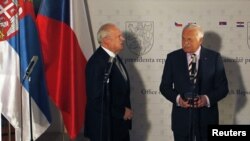BUDAPEST —
Just after midnight on January 1, 1993, fireworks illuminated the skies over Bratislava as firebrand Prime Minister Vladimir Meciar declared Slovakia an independent republic.
The ceremony marked the end of Czechoslovakia, a politically stigmatized "artificial state" founded on the ashes of the Austro-Hungarian Empire in 1918.
Slovakia, with just over five million people, divorced itself from what would become the Czech Republic, with a population of more than 10 million, a setback for Vaclav Havel, the former dissident playwright who became Czechoslovakia's last president after the Velvet Revolution ended Communist rule in 1989.
Though Havel would lead the Czech Republic for another decade, he deeply regretted what some described as the hastily arranged split between the countries, even if he was internationally praised for overseeing a bloodless breakup in a region otherwise plagued by fierce nationalism and constantly simmering hostilities.
Earlier this month, children gathered in the Church of St. Anne for a requiem marking the first anniversary of the late president's death, their sparkling voices reverberating through the Gothic nave.
"From all over the world people are here to pay their respect to Vaclav Havel, who played a crucial role in this country's modern history," said Cardinal Dominik Duka, the archbishop of Prague, recalling how the elder statesmen led his nation through turbulent times.
While Slovaks initially blamed Havel for dismantling the arms industry, whose decline began after the collapse of the Soviet-led Warsaw Pact, leaving many jobless and impoverished, his star eventually began rising anew. As the perceived autocratic and nationalistic polices of Slovakian Prime Minister Meciar left the country internationally isolated, Havel, in the wake of Meciar's 1998 fall from power, guided its entry into the European Union and NATO military alliance.
At a recent meeting between current Czech and Slovak leaders, Havel's impact can still be felt.
Standing beside his Slovak counterpart, Czech President Vaclav Klaus cited 12 visits to Bratislava in less than two terms.
"This shows the closeness of the relations between the two nations despite the split of Czechoslovakia," said Klaus.
Although differences remain — Slovakia's President Ivan Gasparovic adopted the euro currency while the Euroskeptic Klaus held the Czech koruna — ties have improved.
"Today's financial crisis shows that the eurozone is not perfect," said Gasparovic, explaining that he understands reluctance to join the 17-nation eurozone. "But the goal of Slovakia and other countries is to save both the European Union and the eurozone."
Their currencies different but their languages similar, Czech and Slovak parliaments will meet in Prague next month to discuss their 20 years of cooperation changing roles within the EU and NATO.
If nothing else, the "Velvet Divorce" seems to indicate that countries in the former Soviet-dominated region can peacefully resolve historic disputes — at least in some cases.
The ceremony marked the end of Czechoslovakia, a politically stigmatized "artificial state" founded on the ashes of the Austro-Hungarian Empire in 1918.
Slovakia, with just over five million people, divorced itself from what would become the Czech Republic, with a population of more than 10 million, a setback for Vaclav Havel, the former dissident playwright who became Czechoslovakia's last president after the Velvet Revolution ended Communist rule in 1989.
Though Havel would lead the Czech Republic for another decade, he deeply regretted what some described as the hastily arranged split between the countries, even if he was internationally praised for overseeing a bloodless breakup in a region otherwise plagued by fierce nationalism and constantly simmering hostilities.
Earlier this month, children gathered in the Church of St. Anne for a requiem marking the first anniversary of the late president's death, their sparkling voices reverberating through the Gothic nave.
"From all over the world people are here to pay their respect to Vaclav Havel, who played a crucial role in this country's modern history," said Cardinal Dominik Duka, the archbishop of Prague, recalling how the elder statesmen led his nation through turbulent times.
While Slovaks initially blamed Havel for dismantling the arms industry, whose decline began after the collapse of the Soviet-led Warsaw Pact, leaving many jobless and impoverished, his star eventually began rising anew. As the perceived autocratic and nationalistic polices of Slovakian Prime Minister Meciar left the country internationally isolated, Havel, in the wake of Meciar's 1998 fall from power, guided its entry into the European Union and NATO military alliance.
At a recent meeting between current Czech and Slovak leaders, Havel's impact can still be felt.
Standing beside his Slovak counterpart, Czech President Vaclav Klaus cited 12 visits to Bratislava in less than two terms.
"This shows the closeness of the relations between the two nations despite the split of Czechoslovakia," said Klaus.
Although differences remain — Slovakia's President Ivan Gasparovic adopted the euro currency while the Euroskeptic Klaus held the Czech koruna — ties have improved.
"Today's financial crisis shows that the eurozone is not perfect," said Gasparovic, explaining that he understands reluctance to join the 17-nation eurozone. "But the goal of Slovakia and other countries is to save both the European Union and the eurozone."
Their currencies different but their languages similar, Czech and Slovak parliaments will meet in Prague next month to discuss their 20 years of cooperation changing roles within the EU and NATO.
If nothing else, the "Velvet Divorce" seems to indicate that countries in the former Soviet-dominated region can peacefully resolve historic disputes — at least in some cases.




